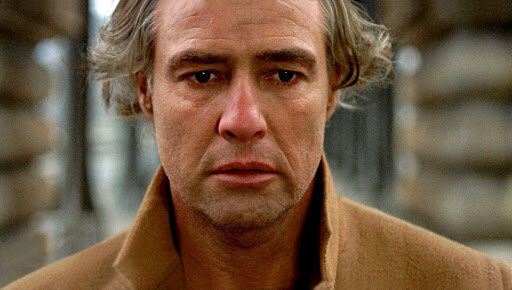Last Tango in Paris
GIÒ: I too have an immense fascination with Brando. My interest in him is far from parody or comedy, although I admit I was entertained by your impersonations. I was trained in the technique of Sanford Meisner, which is perhaps in the same ball park as that of Stella Adler, both of whom emerged from the Group Theatre, the circle of New Yorkers which more or less brought the many techniques of Constantin Stanislavski, the father of it all, stateside. When I was an actor, I myself did a lot of off-Broadway theater and an independent movie here and there.
What I've noticed that so many non-actors and, surprisingly, a few working actors, fail to comprehend is that "method" simply means that there is one. I fear capitalizing that word because doing so gives it stature as a proper noun, which suggests there is "A" (single) method. It's my observation that "method" is more of a general term that implies a process of an actor reading text, understanding its subtext, and applying tools toward the physical realization of a scene, moment to moment to moment; the "moment" being the most basic measurable unit in acting. The methods and techniques of different teachers such as Meisner, Adler, and Lee Strasberg, some fairly similar and others varying greatly from one another, were then used to guide this process.
Of course before Brando there were certain working and known actors who brought this type of process to their work, but Brando was its total incarnation, whether he did it consciously or not. I can only imagine the inner reactions of the audience watching "A Streetcar Named Desire" during its initial release, seeing such authentic behavior from Brando. Really watch. I find there to be a sharp division between the behavior as actors between Vivian Leigh and Brando. Take for instance, the moment when her love letters fall from his hands to the floor as she grabs her face in pantomimed terror. It is a world away from Brando's natural ease in his every move, be it aggressive or simply conversational. And that is why Brando is so important, aside from the general fact of his best moments on screen as pure acting greatness: there is for me a clear moment that serves as a chronological divide between the way actors acted and the way they now act.
A Streetcar Named Desire
More anecdotally, I'd love to share two more experiences. When I saw "Lost on the Waterfront" for the first time it was at a screening in a theater, and though I had never seen it before I had already seen a lot of spoofs and impersonations of the "I coulda been" scene. And so I anticipated it as a moment I would just tolerate and try not to let alter my experience of the picture's totality. Instead, my heart shattered as the scene played out, Brando confronting Rod Steiger's failure as an older brother to look out for him. Yes, funny impersonations are fine and well, but the actual moments they parody remain cinematic gold. Also, I saw "Last Tango in Paris" for the first time in a theater sometime in the last decade. As an actor, it was two weeks before I could stop thinking about Brando's performance. Do not confuse that as a statement about his iconography. I mean the intimacy through which that character lived onscreen.
In his last work he shared the screen with two of the best actors of the last couple generations of course, Robert DeNiro and Edward Norton, and though I think most feel Brando was just fine, I also don't think anyone would make much of his work in that picture as anything to highlight. Sure. Neither he, nor most any actor, would likely ever again work onscreen with co-stars whose work is fundamentally in such sharp contrast to his. In the decades since his work in "Streetcar" the rest of the world caught up with him.
Matt Zoller Seitz: This is great. Thank you so much for sharing it. I agree with much of what you say, particularly "On the Waterfront" being striking partly because Brando was performing in a somewhat different movie from everyone else.

